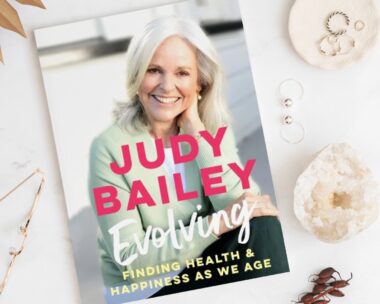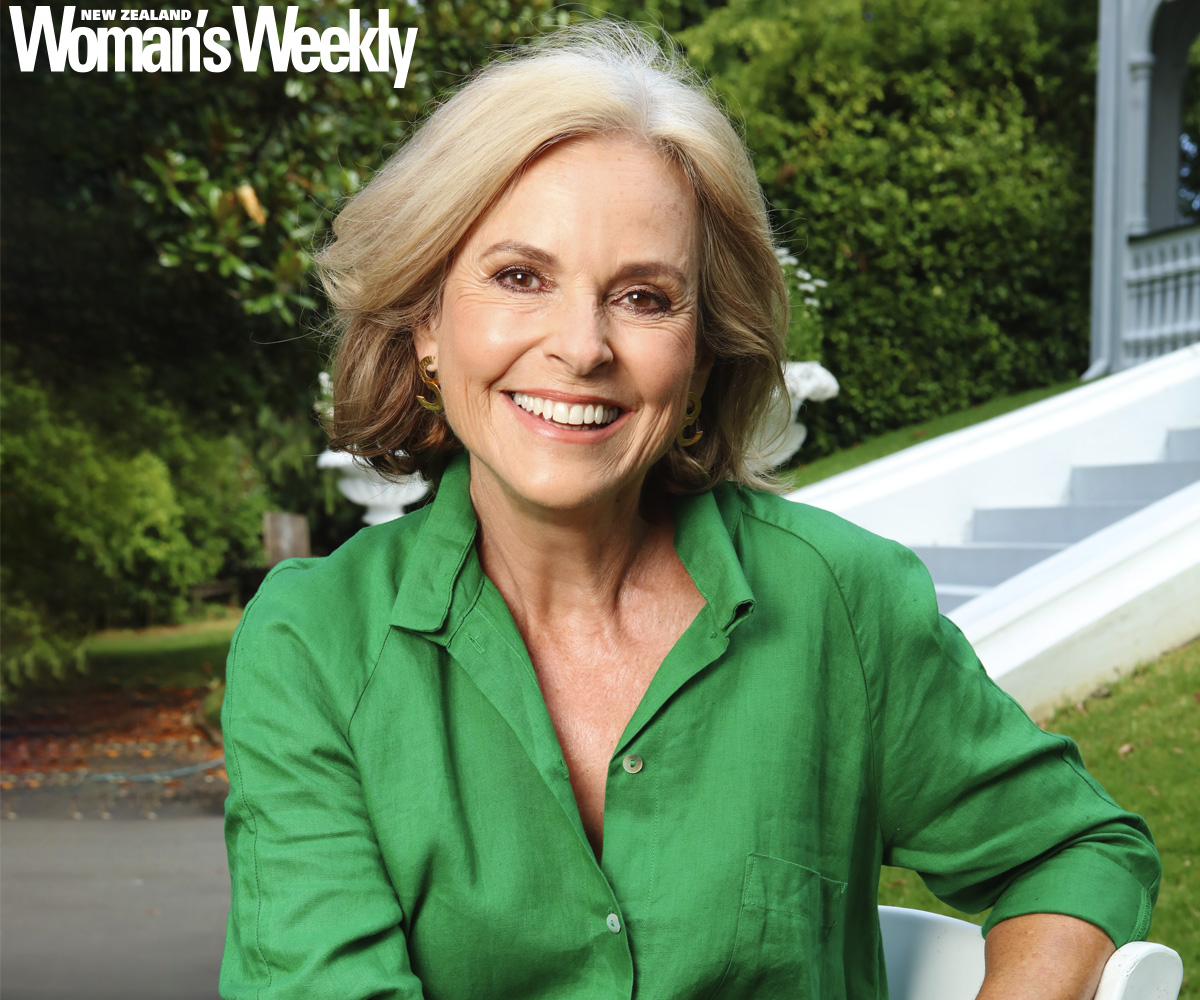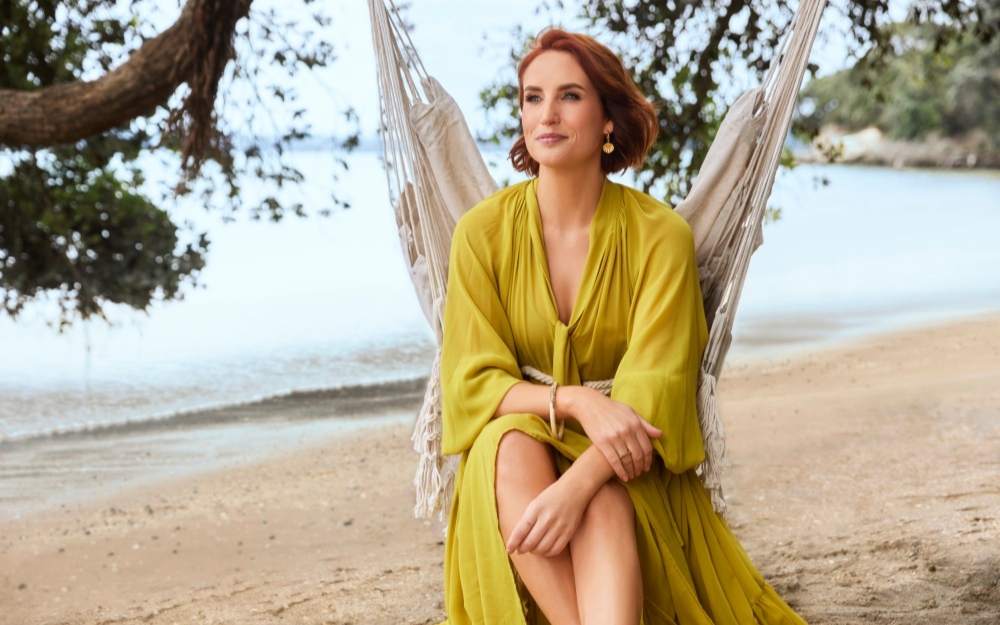As you grow older, you might start to notice that the majority of the available advice highlights just part of the ageing process. Whether it’s what to wear, skincare recommendations or information on staying active, all too often it falls under a headline like, “What to do in your thirties, forties and fifties.”
But what happens after that? With the average female life expectancy now at 83 years, that leaves three decades of a life still left to live. A life still filled with curiosity, change and adventure, if you’re lucky.
It’s a topic that has long been of great interest to broadcaster Judy Bailey, who is in her early seventies and found there was a tremendous amount of uncharted territory to cover. So when she was approached to write the book Evolving: Finding Health & Happiness as We Age, Judy says the offer was serendipitous and she leapt at the chance to dive deep into the research.
“I’m curious about how to age well,” The Weekly columnist shares. “People are always telling you that old age isn’t for sissies and that it’s a minefield, with so many challenges to face. And that’s true – it’s a time when there’s an awful lot of change going on. So I thought, ‘Forewarned is forearmed!’”
Sitting in the sun-filled lounge of her Auckland home, Judy laughs that she is “not terribly good with change”. She met husband Chris Bailey in 1971 and they bought the house we’re sitting in during the late ’70s. She started in regional news at 18 and her career as a journalist expands 50 years. But growing older is an experience that comes hand in hand with change. “I wanted to help people navigate this minefield of ageing – and I wanted to help myself at the same time.”
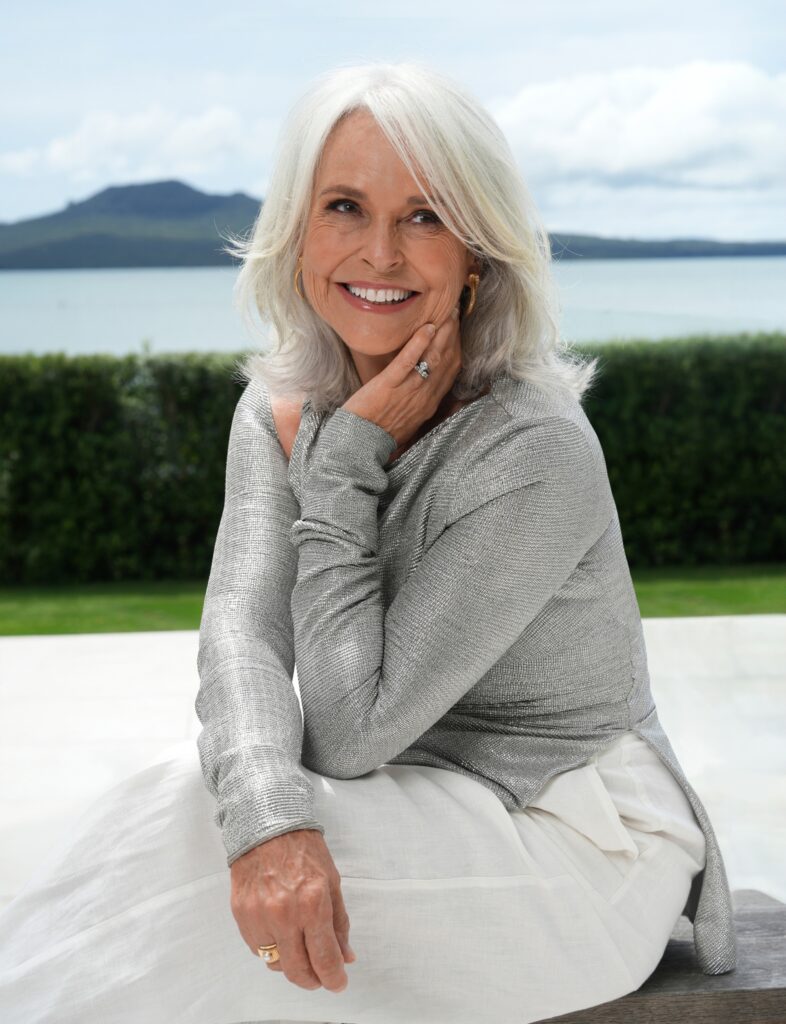
Grandmother of the nation
As the presenter for One News, Judy was one of our country’s most prominent broadcasters, helping shepherd Aotearoa through the events of the day for 18 years. She considers her newsreading career as a total blessing but admits that it never felt like a natural fit. “I was never meant to be a presenter,” she says. “I’m not a razzle-dazzle sort of person. I just fell into it.”
It’s been almost 20 years since Judy left her role at TVNZ in 2005 and, with it, the public persona of being Mother of the Nation. She doesn’t get recognised nearly as much any more. She might get a second glance here and there, she says, but it’s a world away from how it used to be.
After seeing her for so long in the newsreader attire of a short, sharp haircut and polished blazer, seeing her relaxed and elegant at home in a striped linen shirt and blue jeans feels like a peek behind the curtain of the real Judy. Shoulder-length white hair has replaced the close crop she wore for many years, but there’s a reason those second glances are still coming because a) her face is as magnificent as it ever and b) there’s no mistaking that voice. “I do give myself away as soon as I open my mouth,” she laughs, referencing her extremely recognisable speaking voice.

The opportunity to research a topic she was interested in appealed greatly to Judy. She wanted to write a book that covered both the unavoidable realities of getting older, but also the new reality that being in your seventies today is a world away from what it used to be. She explains, “It’s so different, yet people tend to lump you into that ‘old’ category and kind of dismiss you.
“On the telly, you’re either a silver-haired sprightly thing, bouncing about in a retirement village doing all sorts of ‘fun’ things … Or you’re a target for the incontinence pad! But we’re still just people. We’re out there doing things and we’ve got a lot to contribute. There’s an awful lot of ageism in our society. We celebrate youth, but we don’t celebrate old age. And there’s a lot to celebrate.”
Running alongside the research and interviews that make up Evolving is the thread of Judy’s personal experiences – the life-altering impact of Chris’ melanoma diagnosis, the loss of friends to degenerative diseases and her frank admission at living with “the black dog” of depression at various points in her life. They’re harder, darker parts of a life well lived.
But there’s also a brighter story that weaves throughout the book. Her relationship with Chris is a love story that spans over 50 years… A large group of young broadcasters had descended on Tumbledown Bay in Christchurch for a day at the beach. Judy and Chris were the only two that didn’t want to go surfing, so they stayed behind to chat instead.
“We hit it off instantly,” she says, smiling at the memory. “Then I met him at a party a few months later. I was on my own, he was on his own and that was the end of that. Three weeks later, we were engaged.”
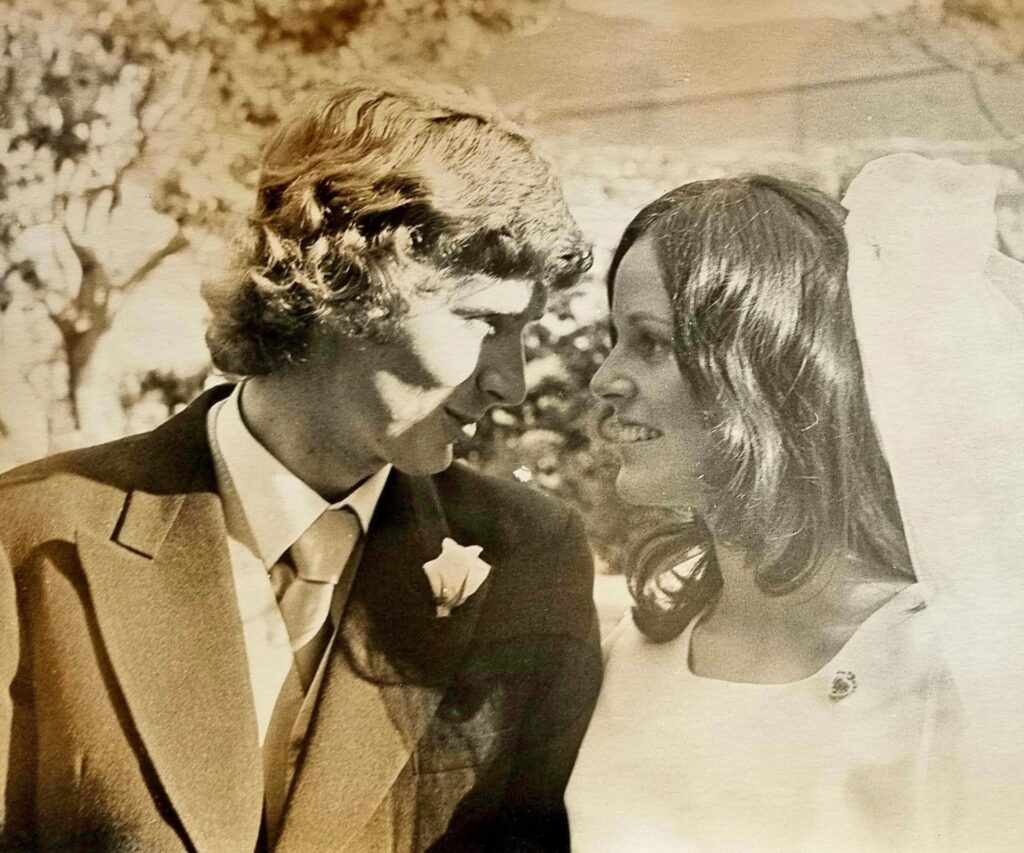
She starts laughing as she corrects herself. “Actually, he asked me to marry him and I said, ‘Ooh, yes, that would be great,’ but when we went to see my parents, as you did in those days, they thought I was far too young and made us wait a year.”
They had a point – Judy was just 18.
“It’s crazy when you think about it, but it’s been amazing.”
The pair will have been married 52 years this year – “Or is it 53? Well, it’s thereabouts!” – and Judy says Chris has always been her best friend and greatest supporter.
“He’s read everything I’ve ever written – poor man – and watched every news bulletin.”
That level of support is a key factor that makes for a good long-term marriage, Judy says. Tolerance is another one, plus a shared sense of humour.
“We’re very similar in lots of ways and quite different in others. He’s incredibly placid and I’m very fiery, so I think we’re quite a good match.”
Both of them brought very high-profile television careers to the table. Chris was the managing director of South Pacific Pictures, the makers of Shortland Street. Along the way, they had three children. They now also have seven grandchildren and another on the way.
Her grandchildren, says Judy, are the joy of their lives. The ages range from 17 to five years old and they’re all extremely close, with the families all holidaying together at Judy and Chris’ bach in the Coromandel.
Judy considers being a very involved grandparent a key factor in her physical health. A longtime devotee of Pilates, she credits it for keeping her active.
“Being able to get on the ground with the grandchildren, kick a ball around and walk the dog, all of those things are so important to me and I think they’re a very important part to getting the most out of life as you age. You want to be able to continue to paddleboard or surf, or continue to do what you’ve always done.”

Anti-ageing secrets
The necessity of staying active and the prioritisation of family are the type of life values that only grow in importance as we age. In all of the research that Judy did for the book, including interviewing leading health and wellness experts from around the world, those were the messages that kept coming back.
She cites the Harvard Study of Adult Development, the world’s longest longitudinal study that started in 1938 and now covers generations of participants. The study has found some of the key factors that influence people living a good life past 80 include not smoking, limiting alcohol consumption, keeping a positive attitude and the quality of relationships.
“They found that a warm and nurturing relationship with somebody who really cares about you is the most important protective factor in healthy ageing,” says Judy.
Those factors also come into play when it comes to dementia prevention. Here is one of the places in Evolving where Judy’s personal narrative is at its most poignant. Both her mother and mother-in-law died with dementia. Judy is open about the fact that losing her mind sits next to losing her husband as her greatest fear.
“It’s the elephant in the room. We’re all terrified of losing our marbles, becoming dependent and becoming a burden on people,” she says.
However, one of the most promising facts she discovered in her research was that half of dementia cases in New Zealand could have been prevented by lifestyle choices – exercising, eating healthily, limiting alcohol, and, once more, staying connected to others.
“Relationships are everything and I sometimes think we’ve lost sight of that,” reflects Judy. “We’re so busy and we’re pulled in so many different directions.”
She can still remember the feeling when she was raising young children. She was working at TVNZ and looking after her own ageing mother.
“You give a little bit to everybody and you just feel fractured. You just want to slow down a bit.” Smiling, she adds, “And that’s what’s so fabulous about getting older!”
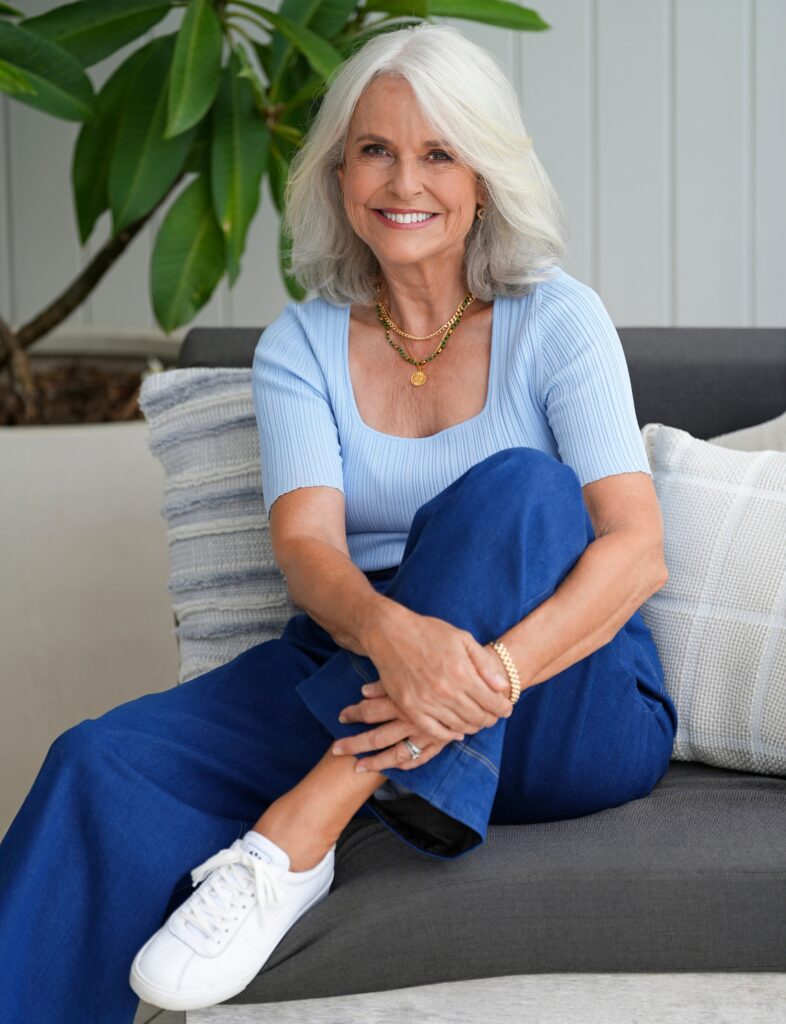
Silver siren
It may seem flippant to follow up such hard-won knowledge with a discussion about the aesthetic side of ageing. But if we’re honest, the amount of time and energy required of women when it comes to our hair and faces as we get older is also considerable. The decision to go grey eventually comes for most of us. For Judy, it was a long time in the making.
“I started to go grey in my twenties and I just kept colouring it,” she confesses. “And eventually I just got bored with it – I wanted a change. I wanted to own my ageing, really. I didn’t want to be spending all of that time – and money! – dyeing my hair all the time.”
It was a process growing it out.
“I had to deal with a big stripe down the middle of my head – like a badger! – for a while,” she laughs.
One silver lining of COVID was that Judy’s eventual move into grey hair managed to coincide with the lockdowns. “There were a lot of badgers about, weren’t there?” she smiles.
When she was on screen, Judy said she felt a lot of pressure to look young.
“It was probably self-imposed pressure or societal pressure that I subliminally absorbed. Nobody ever said to me, ‘Go and get your eye bags done!’ But I think there still is that pressure to look seamless and fabulous. And it’s not fair because men don’t have that pressure at all. In fact, the craggier they get, the more believable and fabulously credible they are.”
She writes in the book about trying Botox occasionally. She includes one incident where it left one eyebrow stuck up, leaving her looking “permanently quizzical”. Not a great look for a newsreader.
Judy says she’s firmly in the “you do you” camp when it comes to ageing interventions.
“You lose all the character in your face,” she says. “And I don’t want to be somebody’s granny whose face doesn’t have any experience in it! It all adds to my credibility, I think.”
That wonderful face falls into a full grimace when she considers the publicity trail that is coming for her to help promote the new book.
“It’s horrible,” she laughs. “That’s the worst thing, seriously. It’s just putting yourself out there again.”

In Evolving, she talks about how her increasingly public persona overwhelmed her with self-conscious thoughts of never being able to measure up. Thoughts that still plague her whenever she tries something new. “It’s a lonely place to be,” she writes.
If community is the sun that good health revolves around as we age, then the effects of loneliness can cast a long shadow. One study cited in Evolving has found the effects of social isolation can be as bad for your overall health as smoking 15 cigarettes a day, so your social life is yet another aspect of life that requires maintenance as you get older.
“When you get to my age, you go to more funerals than you do weddings. Your friendship circle begins to diminish a bit, so making new friends is really important,” explains Judy. “We really need to look out for people who are isolated and lonely in the community. Reach out to them as much as we can, even if it’s just smiling to someone in the supermarket. A smile can just change your day.”
With strong family and friends around her, overall good health, a long-term marriage and a mortgage-free house, Judy knows she’s in a luckier position than many when it comes to getting older. But some truths still hit home.
“Inevitably, you will encounter grief – if you’re lucky, it won’t be until you’re pretty old,” she muses. “But your view of death and loss changes as you get older. As you begin to realise that life is finite. You think in terms of years – single years, rather than decades.”
That mental shift, she says, is confronting, but it also forces a sense of clarity.
“When you think, ‘Well, in 10 years, I’ll be in my eighties and I might not be able to do what I want to do,’ the message really is to seize the day and get on with it! Live your life, and live it as fully and happily as you can.”
One of the final big lessons that Judy’s research shows is that having a purpose in life is another big key to ageing well. That can see you through the massive life shift that comes with retirement, which Judy calls “the R word”, when suddenly your life isn’t defined by career any more.
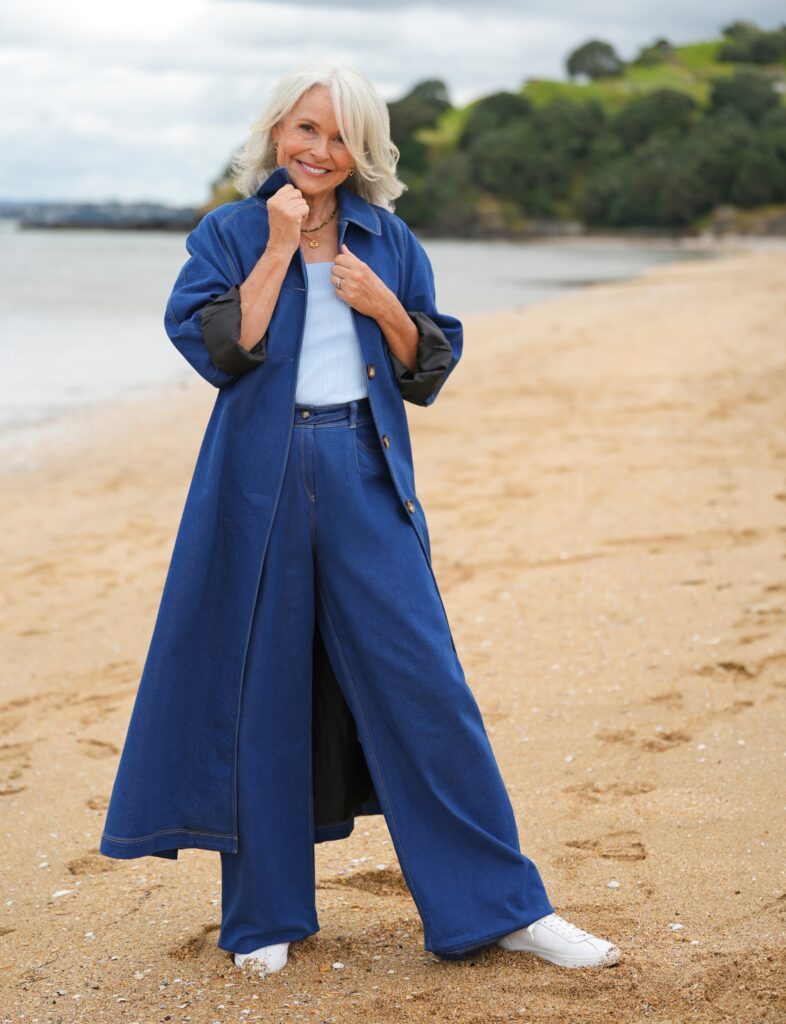
For Judy, that focus is obviously family. With such a large line-up of grandchildren, she doesn’t “really have time for anything else”, she laughs. For years, she has actively engaged with various charities such as The Brainwave Trust, Women’s Refuge, and Hospice. Additionally, her curiosity has driven her journalism career, leading her to interview countless individuals for this magazine and ultimately to author her first research-based book.
On her kitchen table there’s a psychology textbook, possibly heralding yet another avenue to follow, and she’s passionate about studying te reo Māori in the future. Her appreciation for the holistic health of te ao Māori has only grown after discussing it in Evolving. Following that curiosity has worked out very well for her so far as there’s always a new topic of research to delve into.
Our hour together is up and it’s time for Judy to shift into grandmother mode, with her granddaughters soon to arrive from up the road. The sun is still pouring into the lounge, a family room extension they added to the original house that holds big squashy couches, floral curtains and a giant dog bowl that belongs to their huge but endlessly patient Rhodesian ridgeback, who allows all the small grandchildren to clamber all over it.
This house, built in the early 1900s, and bought by Judy and Chris in the ’70s, will be their forever home. They just keep adding bits on to the strong foundation when they need to. It’s a good way to build a family home and a great way to build a long-term career. To keep on evolving throughout a life well lived.
Read an exclusive excerpt of Evolving by Judy Bailey today.
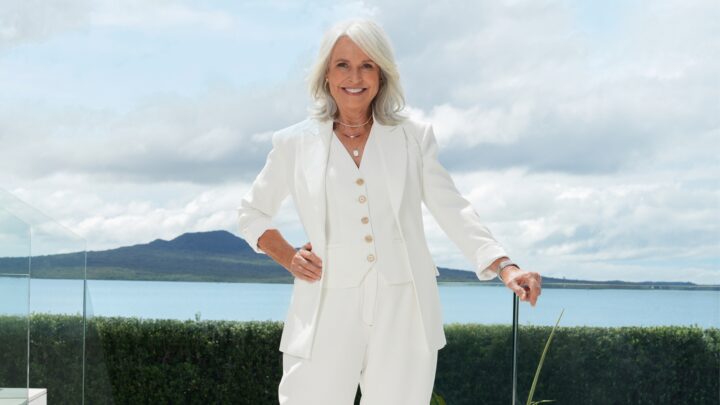 Photography by Robert Trathen
Photography by Robert Trathen
